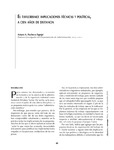| dc.contributor.author | Pacheco Espejel, Arturo Andrés |
| dc.date.issued | 2010-12 |
| dc.identifier.uri | http://hdl.handle.net/11191/2961 |
| dc.description.abstract | En este trabajo nos proponemos hacer revisión integral del taylorismo, retomando sus principales propuestas de tipo técnico y organizativo del trabajo, las cuales fueron acompañadas, de la necesidad ineludible de la retribución adecuada que asegurara el involucramiento y la motivación del trabajador. Posteriormente analizaremos las implicaciones ideológicas y políticas que tales propuestas técnicas tuvieron en las relaciones de poder entre los principales actores empresariales, patrones y trabajadores, particularmente en la disputa por el control del proceso de trabajo, con resultados eminentemente negativos para los niveles de conciencia colectiva de los trabajadores como actores potenciales de cambio social. Finalmente, haremos algunas reflexiones sobre el significado histórico de la propuesta de Taylor dentro de la evolución de las formas de organizar los procesos de trabajo, al contrastarse con el llamado toyotismo, que tuvo su origen en el Japón de los años 70 y 80 del siglo pasado. En ese sentido, ubicaremos la vigencia y la pertinencia del taylorismo en las condiciones actuales de globalización capitalista y de intensa y salvaje competencia en las que se encuentran las empresas hoy en día. |
| dc.description.abstract | This text has the aim of carrying out an integral assessment of taylorism, taking into account first of all its main proposals about the technical and organizational type of work, which were accompanied, as mentioned above, by the unavoidable necessity of the adequate retribution that assures the involvement and motivation of the worker. We will subsequently analyze the ideological and political implications that such technical proposals had on the power relations between the main business actors —employers and workers—, particularly in the dispute for the control of the work process, with eminently negative results for the collective conscience levels of the workers as potential actors of social change. Finally, we will develop some reflections about the historical significance of F. Taylor´s proposal in the evolution of the forms of organizing the work processes, contrasting it with the so-called toyotism which had its origin in Japan in the 1970s and 1980s. In this regard, we will pinpoint the validity and pertinence of taylorism in the current conditions of capitalist globalization and of intense and fierce competition in which modern-day firms are situated. |
| dc.format | pdf |
| dc.language.iso | spa |
| dc.publisher | Universidad Autónoma Metropolitana (México). Unidad Azcapotzalco. |
| dc.source | Gestión y estrategia. Número 38 (julio-diciembre, 2010), ISSN 1606-8459. |
| dc.subject.classification | CIENCIAS SOCIALES::CIENCIAS ECONÓMICAS::TEORÍA ECONÓMICA::TEORÍA Y MODELOS DE EMPLEO |
| dc.title | El taylorismo: implicaciones técnicas y políticas, a 100 años de distancia |
| dc.type | Artículo |
| dc.format.digitalOrigin | Reformatted digital |



